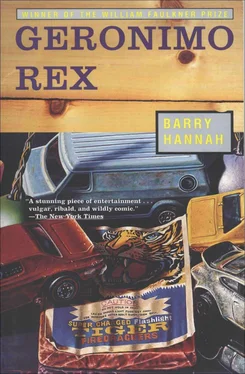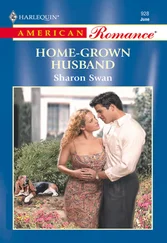“Damn that organ!” he said, in a sudden blast. “This time of the evening.” I had seen Zak express a lot of phony emotion in the drama class, but now he seemed to be real. “ This time of the evening …” He held his hands to his ears and burst out, “ This time of evening I tried to make love to her in the wheelchair … oh, it’s all just a horror and a gloom! … and she farted , dear sweet Linda. What kind of earth is this?” Even as he said this — and I was shocked along with the others — the organ shrilled up in a torrent, triumphant. It mocked Zak, his sudden confession; it drew the gloom out of you and then mocked the gloom. I made a decision and ran in the dorm up three flights of stairs to my room.
I pulled out a drawer and yanked aside the tee shirts. I hadn’t seen the pistol, the one the old man gave me, since I’d put it in the bottom of the drawer the first day at Hedermansever. It was a joy to find, a brutish little Italian hero. I got my raincoat, dumped the gun in the pocket, and put on the raincoat. Before I left the room I picked up one of the books and looked again at the photograph of Geronimo holding his gun. Looking at the filthy scarf around his neck, I wanted it.
When I made it back to the front steps, Zak and the others were saying nothing to each other. The organ was still going, and the group was still paralyzed in depression by it. The night had almost come down. Then I saw Fleece walking past the auditorium, coming from his lab, toward us. He was looking backward toward the windows of the auditorium. As he came up to us, his face was full of pain.
“Who needs that goddam organ ?” he said.
“Let’s stop it. Stop him, whoever it is,” I said.
The alcoholic boy rubbed his hand through his forlorn crewcut and stood up and assented. Zak, with all his biography, began walking, Fleece joined us, and the rest of them fell in. By God, I thought, we are in motion, this pack of misery all together. I couldn’t feel the ground under my feet. It was trancelike. I thought of what Zak had said about his lover in a wheelchair. Thinking of the wheels themselves, I moved along at the head of them, rolling. In the auditorium windows I could see the tiny light of the music viewer of the organ. The player was still fingering zealously and to my mind the sound was like monstrous dominos of tin falling. I told the group we would go in by this side door, and we did. We went by the basement class-rooms and climbed the stairs, went to the left through a door, to the stage. The organist was undulating, by himself, below the other end of the stage. We drew up, over him, and saw him waddling away on the pedals in his sock feet. We were in the total darkness of the stage and he was down there alight from the tiny lamp over his music. I put my hand on the pistol in my pocket. I knew then I would use it. The pistol felt so automatic. And mechanically, it was. I felt high and loose. I took a book out of Fleece’s hands. I pitched the book onto the keys of the great wooden organ. The organist was in a fit of holy music and barely recognized the event.
“Stop,” I said. He stopped and looked up toward us. “Get out of here. Keep your eyes down. Or you’ll get hurt.”
“I have permission,” he said.
“You didn’t get permission to depress us with that damned organ.” I spoke; the rest were completely silent. “You’d better stop. We can’t stand the organ.”
“Can’t stand Bach, well, I …” started the organist.
“I know it’s Bach. I know you wanted it to sound like it was coming out of some cathedral. I thought about you in here thinking you were so lonely and holy. I was thinking about you looking at your own fingers moving on the keys. You thought you were the final word.”
He picked up his music, stepped into his shoes, and flicked off the music light on the organ. Still, he really didn’t want to leave, not seeing me yet, trying to see the rest of the group on stage too. He was dallying, I saw, even in the brown gloom. I really couldn’t stand him. I saw him put his hand on a seat and turn to try to discern who we were and my patience was at end. “Get out!” I told him. I had forgotten the pistol. I was ready to leap off the stage and grab him with my hands. This time of the evening, like Zak said; this time of the evening, that organ falling down on you like the wreck of some old tinny car, the gray tin pieces of it going right in your brain, releasing, God knows, all the horrible streams of your life. Gaf! Oh, me!
The organist was nearing the doors of the auditorium. I saw his wobbling shadow near the windows; there were lights in the lobby outside. His form was nearing the lights. He was reaching the end of the auditorium, where we all were commanded to sit down three times a week. Where in the seats and on the floor were the fingernail dirt, the plucked eyebrows, the scratched-off scalp particles — the germy castoff of the bored, during those speeches; where now, I saw, pulling out the pistol and aiming it at his back, the gloom came in brown as your very sweetheart’s fart. At the last second I pulled the gun over to the right and shot the wall next to the door, as he went out. Pooooooom . Then all the echoes, a screech in the lobby, a sort of trance filled with clangs for me.
“Monroe had a gun!” someone behind me yelled. Then I heard them bolting for both wings off the stage. Someone took me by the arm. It was Fleece.
“If we get out of here quick, it’ll be all right. He couldn’t have recognized us,” he said. I noticed Zak was still on the stage too. He wanted to run, I think, but had been frozen. He was very concerned. We passed him going out. Fleece asked him if he didn’t want to leave too. Somebody would be back soon, and it would be curious to see the drama professor still on stage, with his arms frozen in a posture of flight like that. He touched Zak.
“Monroe. You weren’t aiming at our organ friend, were you?” asked Zak.
“No, no, no.” I shook like the devil. I was cold.
“He had left the organ. He had stopped playing … yet you pulled a gun, you shot… after all, a harmless organist …,” Zak said.
“Was not harmless,” I chattered. “Don’t forget …” We opened the basement door and were out of the building. I grew warm suddenly, lying to Zak, all flushed out in a false cause. “I had to. I did it all for your fiancée in Denver.”
Zak himself was a harmless queer, and believed in heightened moments of friendship. He looked at me with ineffable gratitude as he went off to his car. Zak had a lot of grayish blond hair which he tossed around emotionally, true to drama.
Another day, a week later or so, I was still tingling in my head, feeling that I was in danger. My mind pounded, for the first time in my life, as if it was a thing distinct from me. And in my body I experienced cold sprays of nerves. Life shot through me as if existence really meant something. Before pulling the trigger in the auditorium, I seemed to be only verging toward life — say, like a man eating color photographs. But now the excitement was hounding me. I was thinking about Adolph Sax, the inventor of the saxophone, listening to Sonny Stitt on the phonograph. Then I heard David Newman, the sax-player in Ray Charles’s band. What a thing, to have invented, finally, the horn that actually talks? I shouted. Fleece looked over at me snidely.
“Sounds like a nigger who’s been made into a bagpipe,” said Fleece. Thinking back just then, I realized my old friend Harley Butte might’ve said something like that. I remembered that Harley and I were in the same state. He was directing some band somewhere, surrounded by pine trees. I wondered if he had them out on the field now, under his baton. By now he had had several months with them. Were they as good as Jones’s band in 1950, ten years ago? How could they be? The bursting dust, the blue Napoleonic spades.
Читать дальше












